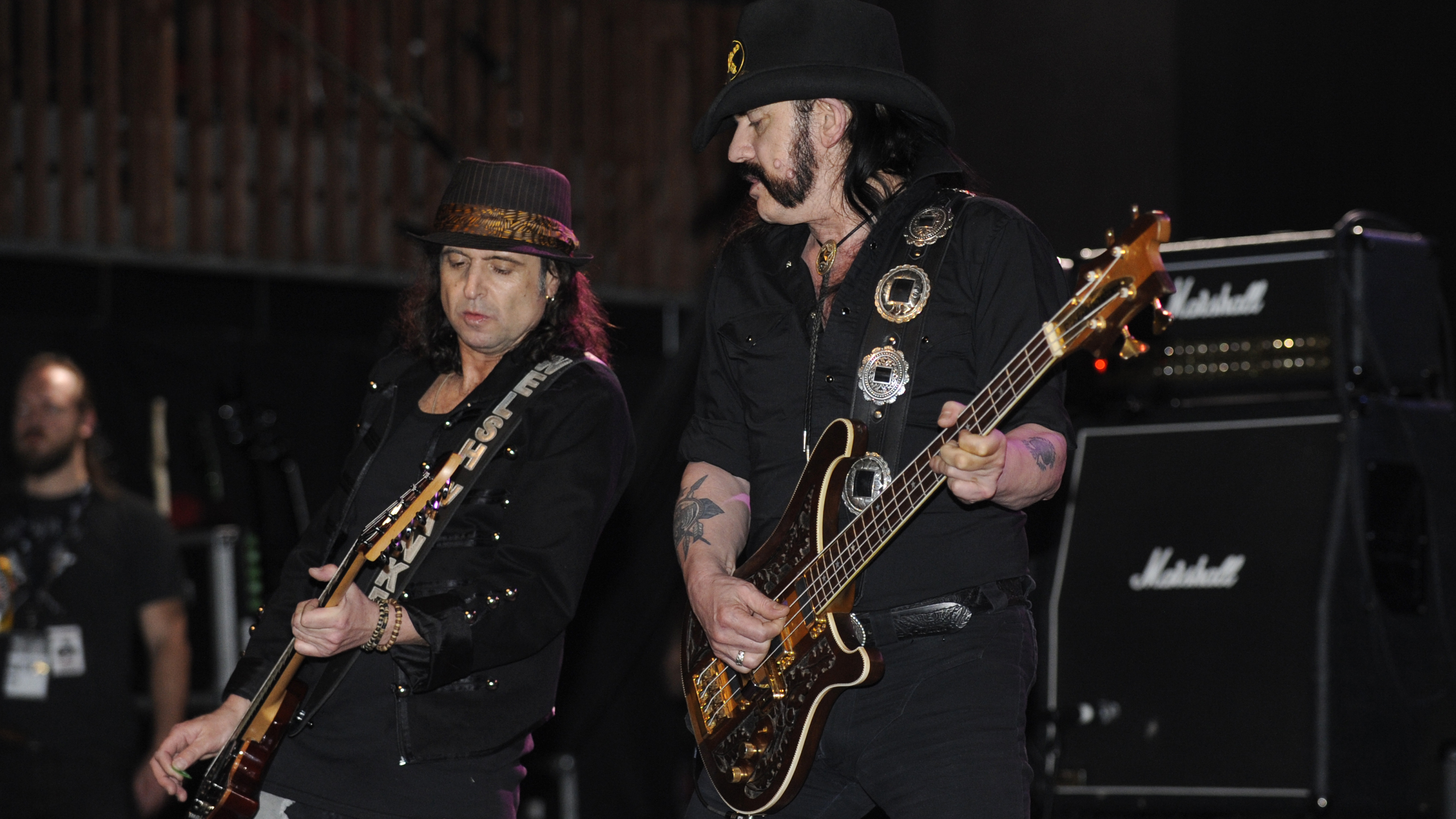In February 2014, Phil Campbell celebrates 30 years as Motörhead’s guitarist. Those three decades have seen the modest Welshman with the rampaging guitar and deep-as-the-valleys voice go from a fresh-faced upstart tasked with the Herculean challenge of filling Fast Eddie Clarke’s boots – albeit alongside fellow six-stringer/partner-in-crime, the late and very lamented Michael ‘Würzel’ Burston – to the second-longest serving member of the band and Lemmy’s right-hand man. It’s a landmark anniversary, but one that he’s keen to play down. “I’m not big on making a fuss about things,” he says.
Phil clearly isn’t one for nostalgia. “The past,” he says, “has already been well documented.”
He’s infinitely keener to talk about Motörhead’s 21st album. “Aftershock is a brilliant record, even if I say so myself,” he says proudly. “So what do you want to know about it?”
How do you know when it’s time to make a newMotörhead record? Who calls who?
When we get fed up of touring, that’s when. We start doing stuff in soundchecks, working up ideas and things, and it kind of grows from there. The record label actually wanted us to record last year, but we said, “No, we’re not ready.” We actually put our foot down for once.
When did you start working on Aftershock?
We did start working on some ideas last year, when we were touring – doing stuff in soundchecks, that sort of thing. And then we went into a rehearsal place earlier this year and did some more writing. It’s not like we’ve done in the past. Before, we’ve gone in and hammered it out in six weeks, the writing, but there’s been more of a time span this time.
Did that make things easier this time round? A bit more enjoyable?
Yeah, a little bit. You get a chance to think things over. You have more chance to change things and whatever. I think at our stage of the game, we deserve that luxury.
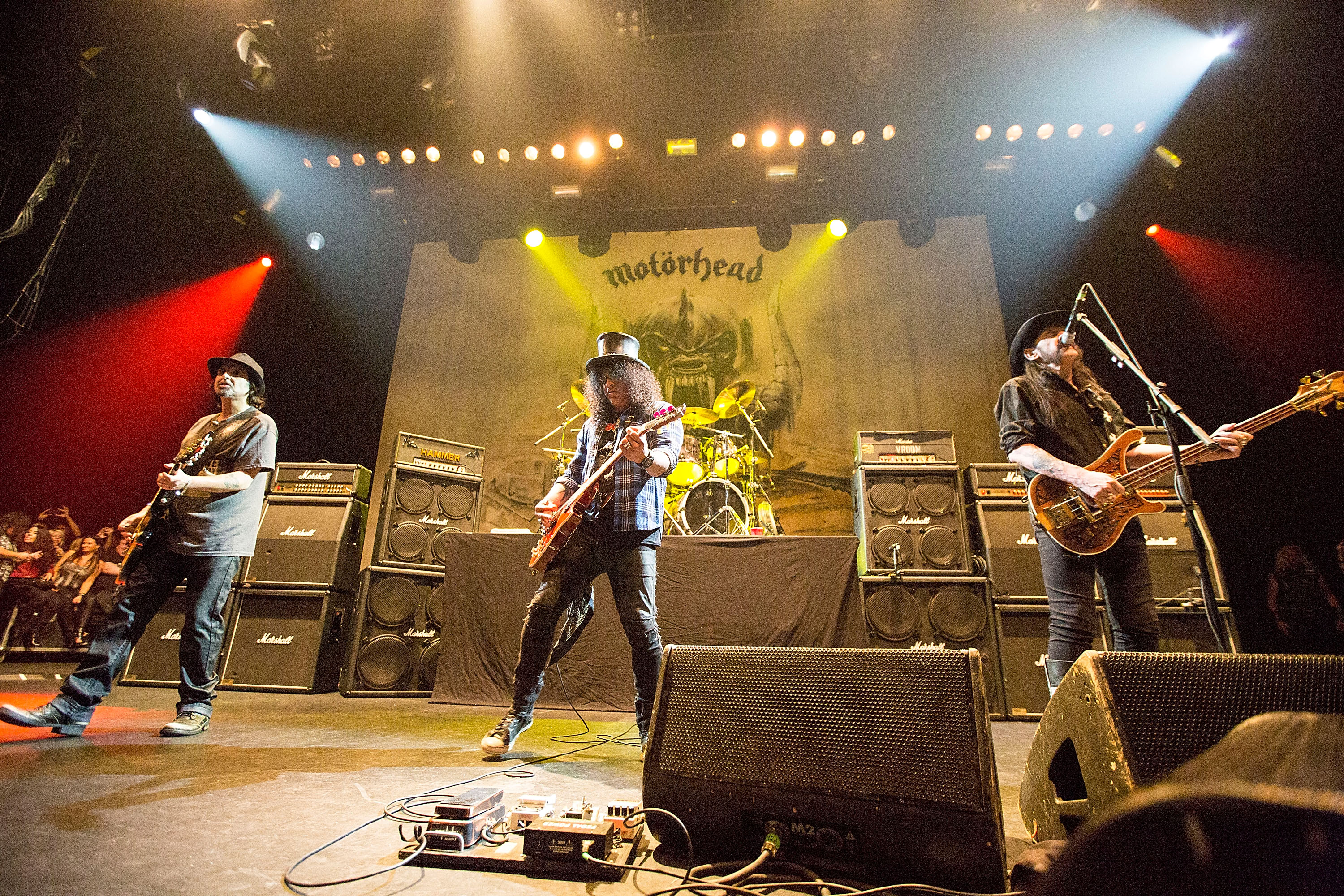
Ever listen to your old records for inspiration?
No, we don’t listen to the old ones. What’s the point? We’ve already done them. We try to come up with something new every time. But for it to sound like Motörhead, the broadband is not that broad – we’re not going to go jazz. But if we want to put an acoustic guitar on, or a cello, then we’re happy with that. It’s still Motörhead. And anyway, it’s our music and we’re entitled to do what we want with it.
Who do you write for? The fans? Yourselves?
We write for the three of us. No offence, but we don’t write for any fans, we don’t write for critics, we don’t write for record companies. We write for ourselves and ourselves only. It means it’s pure then. Nobody interfering with it.
Do you write together or do you all turn up and chuck your individual ideas on the table?
We chuck some ideas on the table and then we mix and match. I’ll come up with stuff by myself, and then I’ll come in and play it to the boys, and they’ll go, “That one’s really good, that one’s a piece of shit.” And I’ll say, “It’s not a piece of shit!” and we’ll start arguing for a bit.
What sort of thing did you bring to the table for this album?
Well, there are two ballads that are mine, though Lem did all the lyrics.
Can you describe them?
One’s a bit like ZZ Top meets the Eagles, called Lost Woman Blues, and the other one is an odd little ditty called Dust And Glass, which is a bit like The Doors.
The Doors? That’s sounds like a departure from what Motörhead usually do.
It is a little bit. It’s odd. It’s not that much of a departure, but it’s something different, like.
Is that the only song on the album that would really surprise Motörhead fans?
There’s a few on there, I think. I don’t really know what people are expecting. It’s hard to tell. But we’ve got more tracks on this album than we’ve ever done before – it’s 14 tracks, all original stuff.
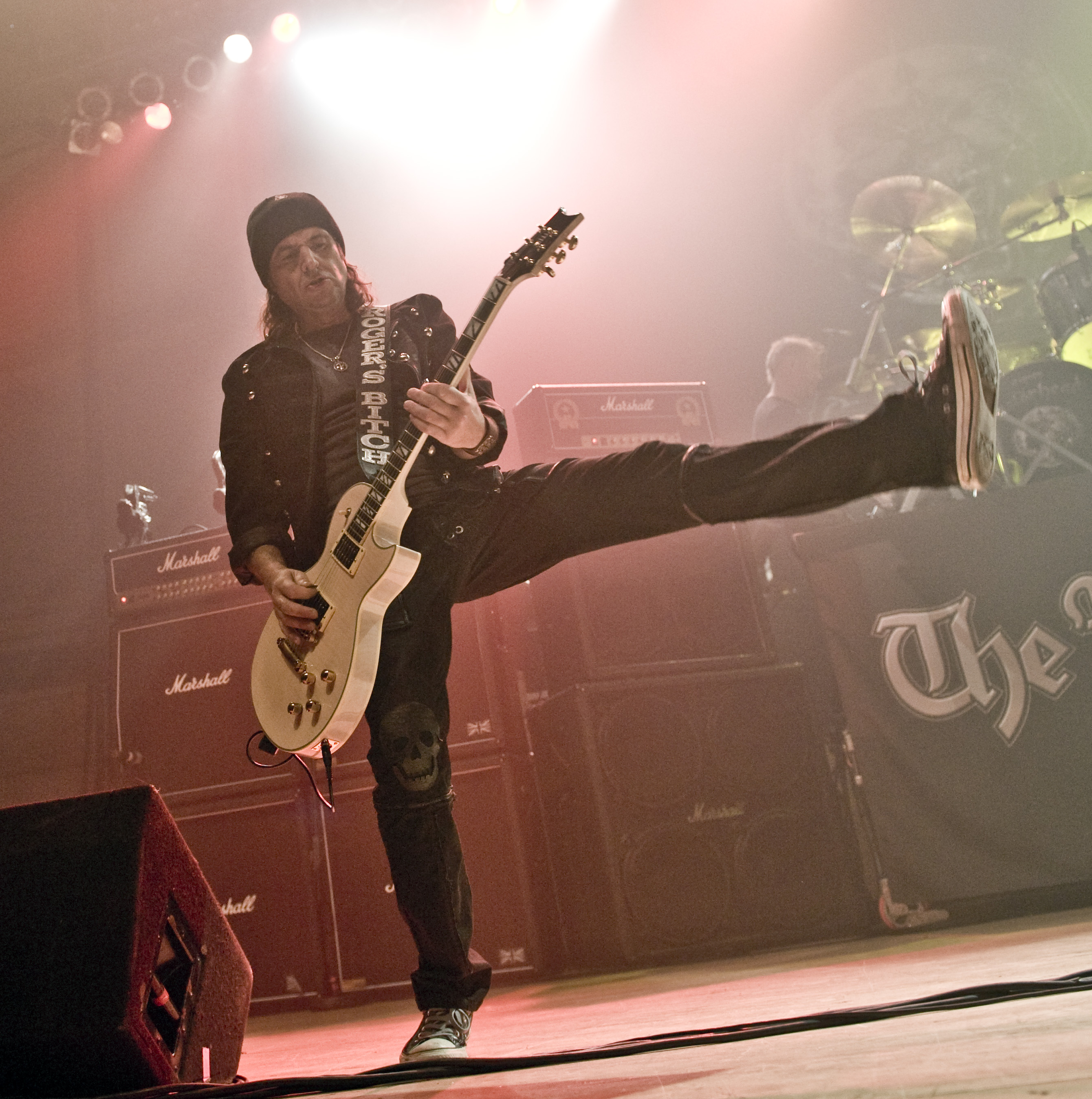
Do you have a favourite guitar that you use in the studio?
I have a favourite guitar, but none I use in the studio – it’s too expensive to ship. I have my LAG, my original LAG guitar, but I used some of the studio guitars. They had quite a comprehensive range. On Dust And Glass, the Doors-type thing, that was a 70s Telecaster. Then there was a 60s gold-top Les Paul on some tracks as well. It doesn’t have to be a classic guitar – if a twenty-dollar guitar sounds good for a certain part, then I’ll use it. Whatever makes the right sound.
In the studio, is it all work, or do you ever kick back and have a drink or a smoke?
No, not really. I stopped smoking and stopped drinking. There’s a pool table there. You can hone your pool skills if you want. And I always take a book into the studio.
Which book were you reading when you made the album?
I was reading Rod Stewart’s autobiography, and the Gregg Allman autobiography. I’m a big fan of autobiographies. Not just music ones – any of ’em. It doesn’t even have to be people I’m particularly interested in. I’d rather read an autobiography than Harry Potter. I got confused reading Harry Potter, with all those fucking long names.
Did anything amusing happen in the studio while you were there?
I had a prostate examination in the studio. I don’t know if that’s funny or not. It was over too quickly. I wanted my money back. The doctor wanted to do it on the dining table as well. I told him, “No, there’s a lockable toilet.”
Proctology aside, does it get any easier to make albums after all this time?
No, probably not. You’ve got to keep coming up with something fresh every time. It gets easier in some ways. We’re more experienced with our instruments and we know more about the recording process. But if you want to knuckle down and come up with something fresh, it still takes as long.
You’ve talked about Led Zeppelin and Black Sabbath being a big influence on you when you were younger. But what was the album that had the biggest influence on you when you were growing up?
I’d like Sabbath’s Master Of Reality album. There’s some great stuff on there. Children Of The Grave, that was a song and a half. [Posthumous Jimi Hendrix live album] Hendrix In The West is classic. It was deleted for years, but thankfully I’ve still got my vinyl copy. I can’t believe an album like that would be deleted. It’s one of the finest albums ever. It was recorded at the Albert Hall and the Isle of Wight and in Berkeley. Seven or eight tracks. Fantastic. I was watching bands when I was really young, but I never saw Hendrix.
What was the first band you saw?
Oh, that’s a difficult one. The first one would have been Gentle Giant or someone like that. I saw Deep Purple with Elf supporting at Cardiff Capitol in 1972. I must have been 11 or 12. That was great. But I’d been going to see bands before that.
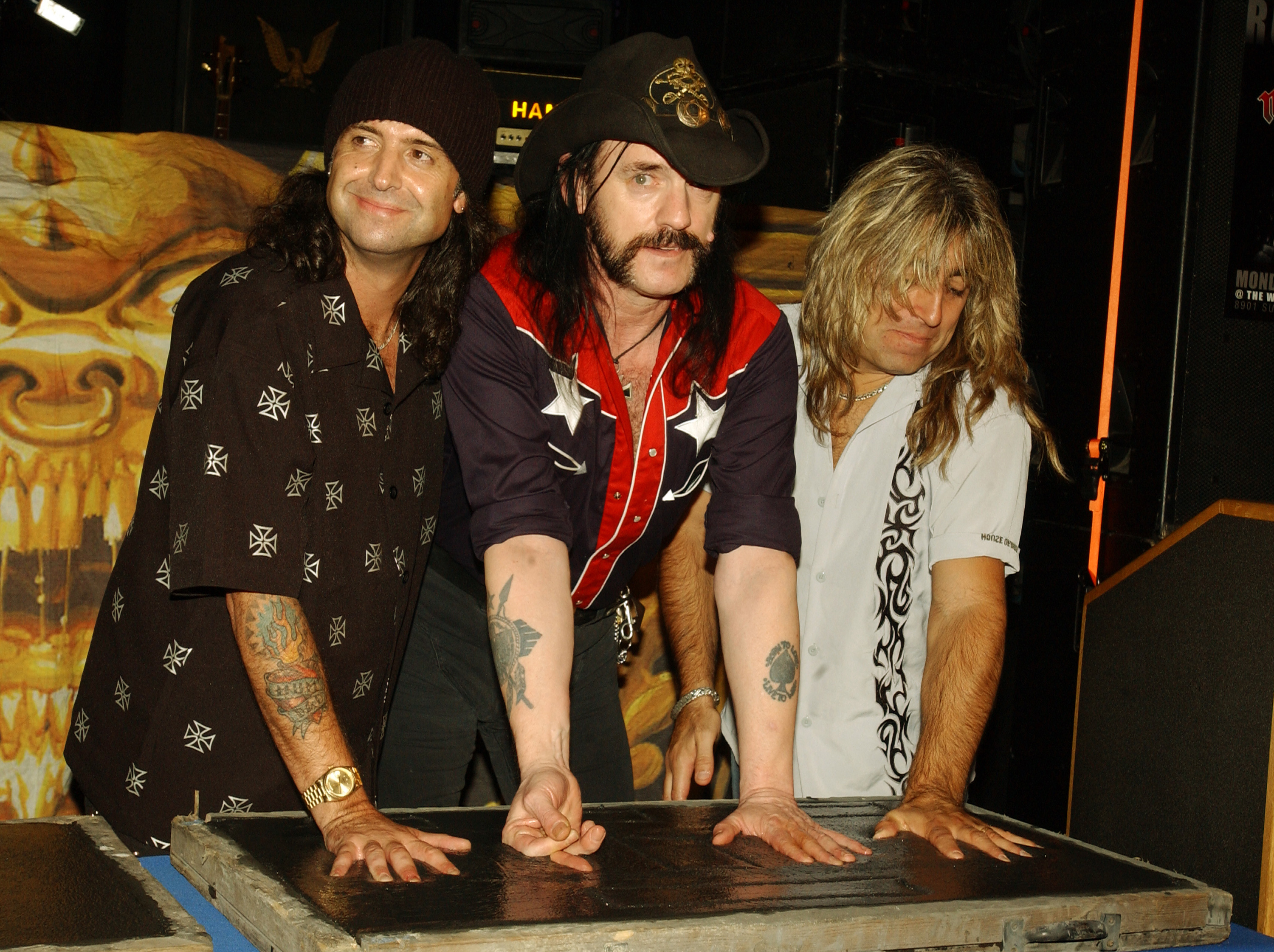
You started playing music early yourself. Your first band was a cabaret act called Contrast.
I was 13. I was drumming then.
You were too young to drink. Did the rest of the band have to smuggle you into the pubs you were playing?
Yeah, some of the time they did. But most of the time they didn’t care. The people in the pubs used to say, “Isn’t he cute? Can he do a drum solo?” So I’d do drum solos and get kissed by all these old biddies with lipstick on. I ended up covered in war paint. I looked like a totem pole when I came out of there.
Sounds like it was fun.
It was a lot of fun. I did it for six years. I ended up playing bass and guitar with them. It was good schooling, though. We always used to arrive late because the van was never on time, and I remember one time I dropped my cymbal case right in the middle of the bingo. They looked at me like I’d shot their families. It was terrible. Never interrupt an old woman playing bingo! Then another time I forgot my cymbals, and there wasn’t a cymbal within five miles. I just had to tap the cymbal stands. That didn’t go down very well. It wasn’t the greatest gig we ever played.
Did the cabaret circuit pay well?
When I was 13, yeah. I remember after my first week, I had twenty pounds in my pay packet. I thought, “Fucking hell, what am I gonna do with this?” It was 1973. I was rolling in money then!
Can you remember where you bought your first guitar?
My cousin lent me a guitar about the same time as I bought that Hendrix album. But I bought my first Gibson when I came up to London in 1973. That one got stolen on tour. I used to buy my guitars from the Bell’s Catalogue [noted instrument sellers], like Shaftesbury and Columbus Les Paul copies, stuff like that.
How many guitars have you had over the years?
God, I don’t know. Hundreds. I’ve got four hundred guitars now. I’ve got more guitars than I know what to do with! I’ve got a ’57 Les Paul original, which is my favourite. It’s beautiful. Sounds amazing.
That must have cost a few quid.
My wife bought it for me as an anniversary present. Original case, original pick-ups. Then I’ve got a ’64 Firebird that used to belong to Jackson Browne’s guitarist.
Going back to your early days on the circuit, your next band was Rocktopus, which is the best band name ever. What was that like?
We used to do covers – Ian Dury and Thin Lizzy and Joe Jackson songs, a bit of Gallagher And Lyle. That was alright for a few years.
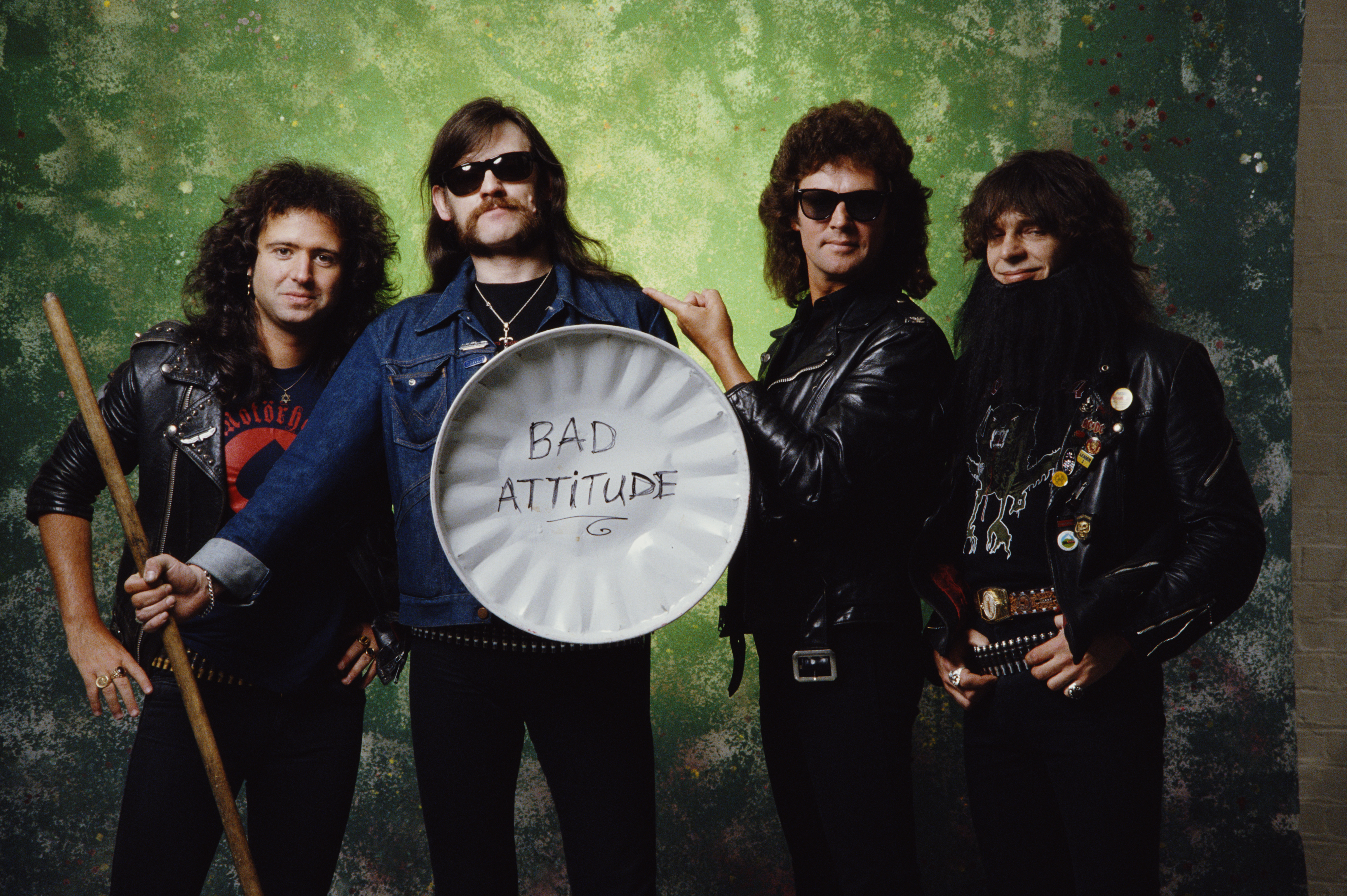
Were you aware of Motörhead back in the day?
Oh yeah, yeah. I just thought it was a load of noise, to be honest, but good noise. It was different to everything else that was out there. I remember it being fresh – I’d never heard anything like it. It was Bomber or Ace Of Spades or something like it, one of them. I remember thinking, “That’s far out.” It was like a spaceship had come down to land.
Where did you get the nickname Wizzö?
I dunno. You’ll have to ask Lemmy that.
You’ve been in Motörhead for almost 30 years now. You’ve made consistently great albums, but do you ever think the band have been taken for granted, especially in the 90s?
A little bit. Everyone else was selling millions of copies, and it’d take us three years to sell a quarter of a million. But we got a good living out of it. Though it would be nice to sell a million copies.
What’s your favourite album from that period?
Bastards. That’s a great album. It’s probably my favourite. 1916, that’s a good one too.
Do you and Lemmy ever argue about music?
Yeah, yeah. Of course we do. “That’s shit,” “You’re talking bollocks, it’s brilliant,” “No, it’s shit.”
Who wins those arguments?
Me, of course!
Every rock band worth their salt name-checks Motörhead as a huge influence. But who’s the most unlikely Motörhead fan you’ve met?
There’s been loads of them. Only I can’t remember any of them!
Do you get a chance to listen to new music?
I get a load of chances to listen to new stuff, but I feel safer listening to older stuff – the things I know. Generally, I go for stuff I listened to in the early days. I don’t really like taking a chance on new stuff, unless it’s something someone really recommends. But Rammstein, I like them. They’re brilliant. We’ve played with them a few times. My kids’ bands are really good as well.
What are your kids’ bands like?
My youngest boy, Tyla, used to be in a band called Tiger Please, but they changed their name to The People The Poet. They’ve a new album, The Narrator, coming out soon. My other two boys [Todd and Dane] are in Straight Lines. It was great a few years ago at Download, all three bands were on the same day. That’s never happened before. I was really proud of that. People should check them both out.
What’s the best bit of advice you’ve given your sons about music?
Don’t listen to your dad.
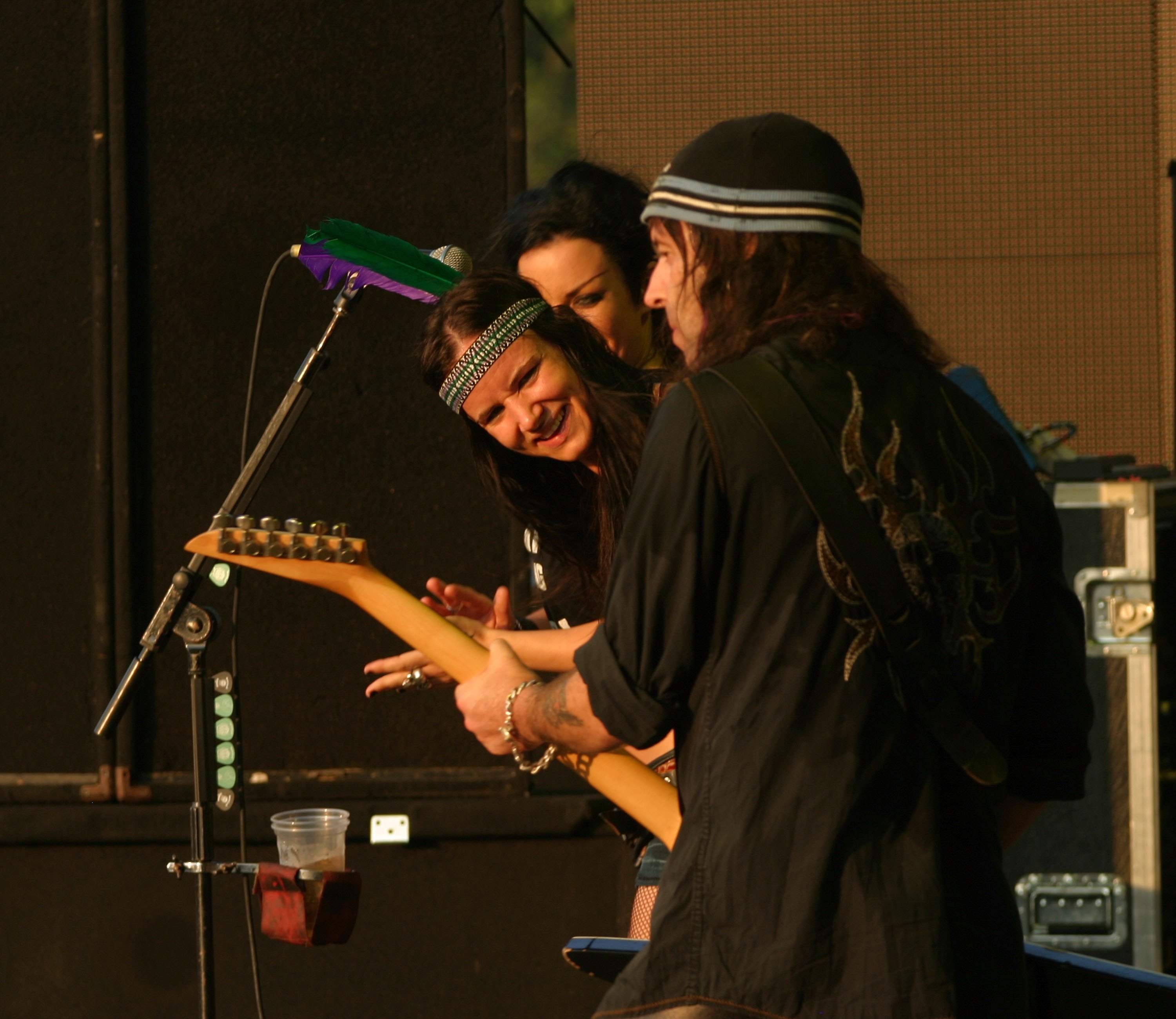
You’ve talked about doing a solo album in the past. How’s that coming along?
I’m just trying to pick up on it again now. It’s a bit difficult, though. My son has a recording studio, but he’s booked up all the time. I can’t get in the bloody thing! It won’t sound like what everyone expects. I’m just gonna do whatever I want. Pianos on it and ballads and trumpets. Bee Gees vocals, maybe. Without the trousers, though.
You’ve talked about Motörhead doing a covers album. Which songs would you choose to cover?
It’d have to be a Bee Gees song, cos I want to hear Lem try a higher register. I dunno… maybe an Eagles song, maybe a Stevie Wonder song. It’d have to be different, though. Nothing too heavy. Otherwise we’d just end up covering our own songs.
It’s coming up to your 30th anniversary in the band. Looking back, what are you proudest of?
That we’re still going, and writing and playing great music.
Are you planning to celebrate?
Yeah, I’ll get some wine gums in. A bumper packet of wine gums.
Did you ever see it lasting this long?
No I didn’t. I don’t think anybody did. We can go on much longer, as long as we pace ourselves. We don’t want to be doing 150 shows a year now. We could just do 20 or 30 shows a year. Instead of playing everyone’s back garden up and down the country, we could do one up north, one in the Midlands and one down south. Do that sort of thing all around the world, instead of playing every nook and cranny. People will travel. They will come.
Do you ever contemplate life after Motörhead?
I’ve never thought about that, no. Why would I? It’s brilliant being a member of Motörhead right now. Everyone’s happy in the camp. We’re writing the best music ever, we’ve got a great new album. Everything’s great.
This article originally appeared in Classic Rock Presents Motorhead: Aftershock.
Phil Campbell and Mikkey Dee join Saxon in a Salute to Lemmy at this year’s Golden Gods Awards on June 13, get your tickets here.
For Dez Fafara’s essential Motorhead playlist, then click on the link below.
